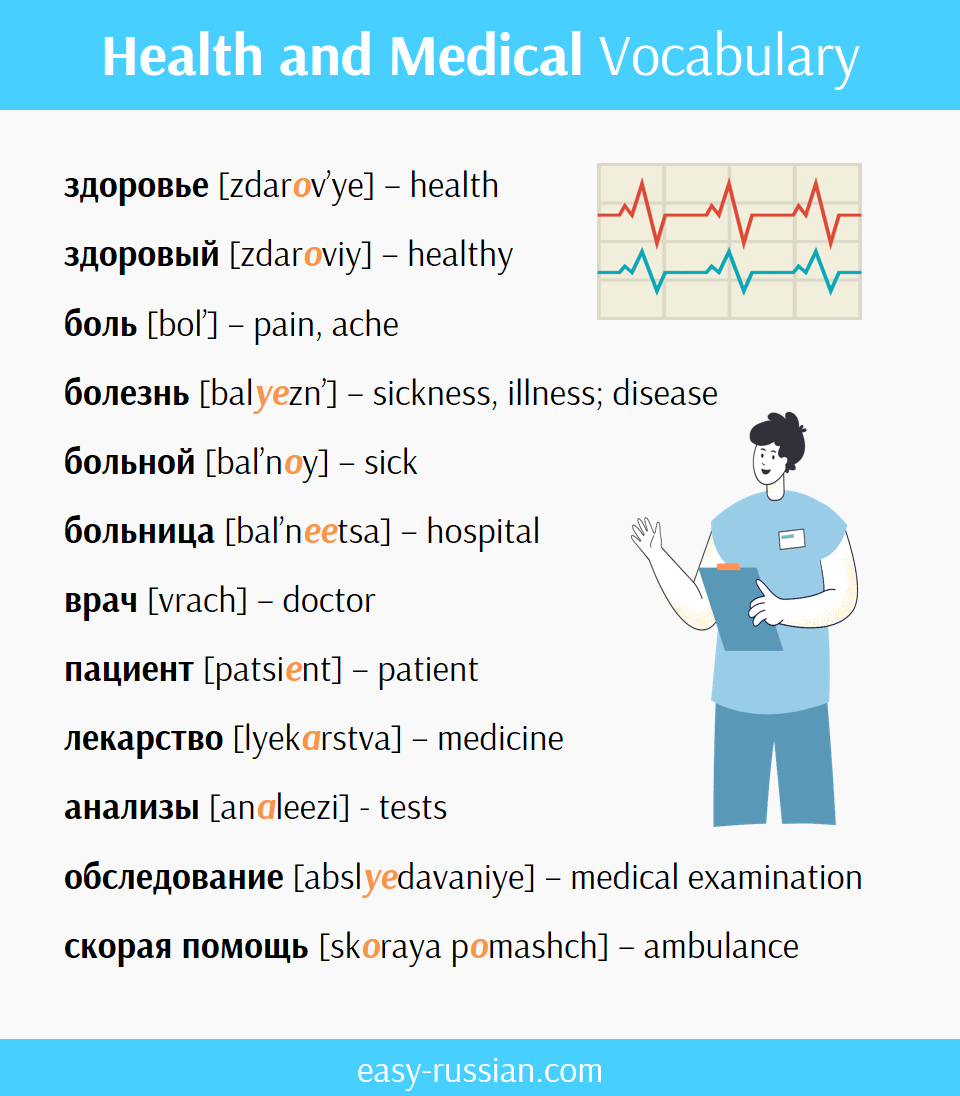Using Russian at the Doctor’s: Health and Medical Vocabulary
Health (здоровье) is really important in our life. When you visit a hospital there are a lot of terms that you need to know to be able to describe your problem, understand what a specialist is saying and communicate with him.
In this post, I gathered a bunch of words and phrases that you will need when attending the doctors in a Russian speaking country. It’s a huge list of medical terms that will also be useful for health specialists.

General terms
When it comes to discussing health in Russian, having knowledge of the appropriate terms is essential. Being able to effectively communicate about health conditions, symptoms, and medical care is crucial.
Here are some important Russian terms to help you navigate conversations about health:
врач (most common) / доктор – doctor
пациент – patient
приём у врача – an appointment with the doctor
медицинское обследование / медицинский осмотр (медосмотр) – medical examination
симптомы – symptoms
диагностика – diagnostic
диагноз – diagnosis
анализы – tests
анализ крови – blood test
анализ мочи – urine test
рентген – x-ray
флюорография – fluorography
лечение – treatment
профилактика – prevention
здоровый образ жизни – healthy lifestyle
хроническое заболевание – chronic illness
реабилитация – rehabilitation
иммунитет – immunity
физическая активность – physical activity
палата – ward
укол – shot, injection
прививка – vaccination
вакцина – vaccine
Internal Organs
кровь – blood
кровеносные сосуды – blood vessels
артерия – artery (артерии – arteries)
внутренние органы – internal organs
мозг – brain
трахея – trachea
лёгкие – lungs
сердце – heart
печень – liver
пищевод – gullet, oesophagus
желудок – stomach
почки – kidneys
внутренности, кишки – intestines
толстая кишка – large intestine
тонкая кишка – small intestine
глотка – pharynx
гортань – larynx
желчный пузырь – gallbladder
селезёнка – spleen
мочевой пузырь – urinary bladder
аппендикс – appendix
пищеварительная система – digestive system
нервная система – nervous system
сердечно-сосудистая система – cardiovascular system
система кровообращения, кровеносная система – circulatory system
органы дыхания – respiratory organs
See Also: Body and Face Parts in Russian
Medicine List
лекарство, препарат, средство – medicine
средство от кашля – cough remedy
раствор, микстура, жидкое лекарство – solution
сладкая микстура/сироп от кашля – cough syrup
антисептик, антисептическое средство – antiseptic
мазь – ointment
леденец (лекарственный), таблетка (обычно сосательная) – lozenges
порошок – powder
глазные капли – eye drops
шипучая таблетка – effervescent tablet
таблетка – tablet
аспирин – aspirin
таблетка в виде капсулы – caplet
капсула – capsule

Medical Supplies and Equipment
медицинские принадлежности – medical supplies
медицинское оборудование – medical equipment
мешок для забора крови – blood bag
брекеты, ортодонти́ческие ско́бы – braces
резиновые перчатки – rubber gloves
машина скорой помощи – ambulance
аптечка – first aid kit
костыль – crutch (костыли – crutches)
ходунок, ходунки – walker
инвалидное кресло – wheelchair
трость, палочка (informal) – cane
скальпель – scalpel
шприц – syringe
стетоскоп – stethoscope
пипетка – pipette
термометр, градусник – thermometer
стоматологический зонд – dental pick
солевой раствор – saline bag
носилки, каталка – stretcher
хирургическая маска – surgical mask
маска (для лица) – face mask
пластырь, лейкопластырь – medical plaster, medical tape, band-aid
бинт, перевязочный материал – bandage
List of Doctors
врач, доктор, медик – doctor
лечащий врач – attending doctor
дежурный врач – duty doctor
семейный врач – family doctor
терапевт – physician
отоларинголог, лор – otolaryngologist, ENT
хирург – surgeon
кардиолог – cardiologist
Кардиолог является специалистом по работе сердца. – A cardiologist is a heart specialist.
онколог – oncologist
Его онколог предложил ему присоединиться к клиническому испытанию. – His oncologist suggested that he join the clinical trial.
гастроэнтеролог – gastroenterologist
эндокринолог – endocrinologist
акушер; акушерка – obstetrician
гинеколог – gynecologist
пульмонолог – pulmonologist
врач-инфекционист – infectious disease physician
офтальмолог – ophthalmologist
невролог – neurologist
анестезиолог, анестезист – anesthesiologist
педиатр – pediatrician
Педиатры заботятся о пациентах с детства до 18 лет или, в некоторых случаях, до 21 года. – Pediatricians take care of patients from infancy through age 18 or, in some cases, age 21.
зубной врач, дантист – dentist
дерматолог – dermatologist
психиатр – psychiatrist
ветеринар – veterinarian
парамедик – paramedic
медицинская сестра (медсестра) – nurse
аптекарь, фармацевт – pharmacist
психолог – psychologist
See Also: Professions in Russian (Vocabulary List)
Diseases
болезнь – sickness, illness; disease
боль – pain, ache
боль в сердце – pain in the heart
головная боль – headache
зубная боль – toothache
головокружение – dizziness
слабость – weakness
тошнота – nausea, sickness
рвота – vomit(ing)
аллергия – allergy
давление – pressure
грипп – flu
Asking about health
Here are some phrases a doctor may use to ask about a patient’s health in Russian:
На что жалуетесь? / Какие жалобы? – What are you complaining about? (=What’s the problem?)
Что вас беспокоит? – What’s bothering you?
Что у вас болит? / Где болит? – Where does it hurt?
Больно? – Does it hurt?
Какая у вас проблема? – What’s the problem?
Какие у вас симптомы? – What are your symptoms?
Давно у вас так? / Давно вы так себя чувствуете? – How long have you been feeling like this?
Как вы себя сегодня чувствуете? – How are you feeling today?
Вам лучше? – Are you feeling any better?
У вас есть аллергия? – Do you have any allergies?
Чувствуете ли вы облегчение или ухудшение? – Are you feeling any relief or worsening?
These phrases are typically used by doctors to inquire about a patient’s health and to gather information related to their symptoms, duration of illness, and overall well-being.
Giving recomendations
Here are some phrases a doctor may use to give recommendations to a patient in Russian:
Вам следует [vam slyedooyet] – You should…
Вам следует принимать лекарство три раза в день. – You should take the medication three times a day.
Вам следует сократить потребление соли. – You should reduce your salt intake.
Рекомендую [reeekameendooyu] – I recommend…
Я рекомендую вам начать заниматься физическими упражнениями. – I recommend that you start exercising.
Я рекомендую вам больше отдыхать и спать. – I recommend that you rest and sleep more.
Важно [vazhna] – It is important…
Важно следить за режимом питания и придерживаться здорового образа жизни. – It is important to monitor your diet and adhere to a healthy lifestyle.
Важно принимать лекарство по рекомендации и не пропускать приемы. – It is important to take the medication as prescribed and not miss doses.
More examples:
Вам нужно сдать кровь на анализ. – You need to have a blood test.
Вам нужно пить много воды и больше отдыхать. – You need to drink lots of water and get plenty of rest.
Избегайте кофеин, молочные продукты и твёрдую пищу. – Avoid caffeine, dairy products, and solid foods.
Идите домой и оставайтесь в постели, пока не станет лучше. – You’ll have to go home and stay in bed until it gets better.
Я могу выписать вам что-нибудь для снижения температуры, но вам просто нужен постельный режим. – I can give you something to reduce your fever but you just need to get bed rest.
Я выпишу вам рецепт на сироп от кашля. – I’ll write you a prescription for some cough syrup.
Принимайте таблетки согласно инструкции в течение трех недель. – Take the pill as prescribed for three weeks.
Используйте эти капли два раза в день в течение десяти дней. – Use these drops twice a day for ten days.
Ничего серьёзного (вам не о чем беспокоиться). – Nothing to be worried at.
These phrases are used by doctors to provide recommendations and guidance to patients based on their diagnosis and health needs. The specific recommendations will vary depending on the individual situation and medical condition.
Talking about general illness

Я не очень хорошо себя чувствую. – I’m not feeling very well.
У меня кружится голова. – My head is spinning.
У меня (немного) болит голова. – I’ve got a (slight) headache.
У меня болит горло. – I’ve got a sore throat.
У меня болит живот. – I have a stomach ache.
У меня болит спина. – I have pain in my back.
У меня высокое давление. – I have a high blood pressure.
У меня температура. / У меня жар. – I have a fever.
У меня ужасный кашель. – I have a terrible cough.
У меня озноб. – I have the chills.
У меня чешется кожа. – My skin is itchy.
У меня сыпь. – I have a rash.
Меня тошнит. – I feel nauseous.
Мне очень больно. – I’m in a lot of pain.
Мне трудно/тяжело дышать. – I’m having difficulty breathing.
Мне больно глотать. – It hurts when I swallow.
Я плохо сплю. – I’m not sleeping very well.
See Also: How to Describe Your Feelings in Russian
Dialogues Between a Doctor and a Patient
Dialogue #1
Врач: Что вас беспокоит? (Doctor: What’s bothering you?)
Пациент: Я несколько дней плохо себя чувствую. У меня была сильная головная боль, а теперь у меня болит горло. (Patient: I haven’t felt well for a few days. I’ve had a bad headache and now I’ve got a sore throat.)
Врач: У вас высокая температура? (Doctor: Do you have fever?)
Пациент: Да, особенно ночью. Мне становится жарко и я начинаю кашлять, когда ложусь. (Patient: Yes, especially at night. I feel hot and I start coughing when I lie down.)
Врач: Ясно. Давайте измерим вашу температуру. Она и правда немного повышена. Теперь давайте посмотрим горло. Откройте, пожалуйста, рот шире. (Doctor: OK, I’ll just take your temperature. You do have a bit of a fever. Now, let me see your throat. Open your mouth wide, please.)
Dialogue #2
Врач: На что жалуетесь? (Doctor: What’s the problem?)
Пациент: У меня сильный кашель и болит голова. (Patient: I have a bad cough and a headache.)
Врач: Как давно у вас эти симптомы? (Doctor: How long have you had these symptoms?)
Пациент: Уже дней пять (Patient: About five days now.)
Врач: Похоже, у вас грипп. Принимайте аспирин каждые четыре часа и больше отдыхайте, пейте больше жидкости. Позвоните мне, если к следующей неделе не пройдёт. (Doctor: It sounds like you’ve got the flu. Take aspirin every four hours and get plenty of rest, drink more fluids. Call me if you’re still sick next week.)
Пациент: Хорошо, спасибо. (Patient: OK, thank you.)
To finish this post, here’s a joke for you:

Subscribe my Telegram and YouTube Channel to get more information on learning Russian. Best of luck!
